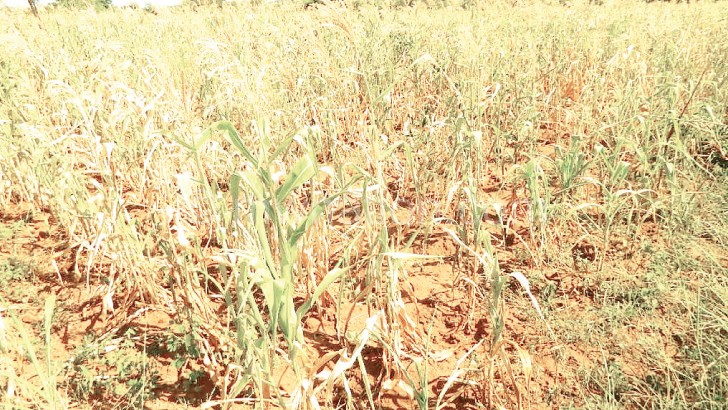Thinking climate change solutions
When he looks at what he has carted home from his field, Moffat Jailosi (56), of Bwerekeni Village, Traditional Authority (T/A) Mwansambo in Nkhotakota, knows what lies ahead for his family.
Unlike in the past, Jailosi says he hardly harvests enough maize to take his family of seven to the next harvesting season. He has no kind words for climate change, which has created erratic weather patterns characterised by irregular rains.
“Something should be done to overcome the effects of climate change,” says Jailosi adding: “If this problem continues, it means many of us will continue to face food shortage.”
He is not the only farmer calling for stakeholders and government to find immediate solutions to the effects of climate change. Both local and international stakeholders have been on their feet to address some of these effects.

For instance, during a recent policy dialogue in Lilongwe organised by Civil Society Agriculture Network (CisaNet), National Smallholder Farmers Association of Malawi (Nasfam) and Food, Agriculture and Natural Resources Policy Analysis Network (Fanrpan) stakeholders brainstormed various solutions to the problems brought by climate change.
Malawi is one of the countries severely battered by the effects of climate change, which has negative implications on food security and economic development among others. In 2015, about 2.8 million people were hit hard by hunger following that year’s floods in January. This year, millions are expected to face hunger due to drought and poor harvests. Experts have attributed both the floods and drought to climate change.
According to the Inter-governmental Panel on Climate Change (IPCC), many areas in Africa will surpass the two degrees celcius temperature rise experienced over the past 20 years. The IPCC also indicates that global food production would decrease by eight percent by 2050 if the current trend in global warming continues.
Commissioner for Rural Economy and Agriculture at the Africa Union Commission, Rhoda Peace, is quoted as saying climate change can cause a fall in yields by up to 50 percent by 2020 in Africa, Malawi inclusive and warns that if no action is taken, small-scale farmers will be hardly hit.
This is why there is need for immediate action because no matter how bad things get, people like Jailosi need to eat.
CisaNet national coordinator Tamani Nkhono-Mvula says if stakeholders relax instead of brainstorming and implementing solutions to the problem, food insecurity in Malawi will worsen because agriculture is the country’s backbone.
He says farmers should get innovative in their farming practices by adopting climate-smart practices which comprise conservation agriculture (CA).
Climate-smart agriculture is defined as farming that sustainably increases productivity, resilience, reduces green-house gases and enhances national food security and development goals.
It promotes agricultural best practices, particularly integrated crop management, CA, intercropping, improved seeds and fertiliser management practices and supports increased investment in agricultural research.
“Agriculture is one of the sectors that contribute to climate change. When we apply fertiliser, the ground releases carbon dioxide and nitrous oxide into the atmosphere. Livestock production also produces methane which goes into the atmosphere and contributes to climate change.
“Agriculture is also the sector which is highly affected by climate change. At the same time, it is a sector which helps many poor Malawians. Therefore, there is need for sustainable solutions to this problem. For instance, we need to reduce the vast emissions coming from agriculture if we are going to have productive and resilient farming,” says Nkhono-Mvula.
If this approach succeeds in all affected African countries, the continent will feed nine billion people by 2050, according to World Bank estimates. Collectively, African governments are pushing for a “triple twins” policy which involves adapting to climate change, maintaining food production and reducing greenhouse gases.
While stakeholders brainstorm on the possible solutions, some farmers are in dilemma in as far as climate-smart agriculture is concerned.
On one hand, some stakeholders are telling them to use hybrid varieties. On the other, other stakeholders encourage them to use local seed varieties because they withstand climate change effects.
“Which is which? Let farmers have one information not contradictions,” says Jailosi, who just started practising CA under the Total Land Care (TLC) project.
The report by Fanrpan partly highlights this farmers’ dilemma. The report shows that there is no shared understanding on the meaning of climate-smart agriculture and the stakeholders often do not talk with each other.
Nkhono-Mvula clears the dilemma by saying hybrid seeds which mature faster and need less rainfall are the ones that farmers should adopt and use to fight effects of climate change such as late begining of rains and prolonged dry spells.
Falai Gwelo, a researcher at Fanrpan, says: “Policies related to climate-smart agriculture are there, but are not standardised. We should speak with one voice for the sake of the farmer.”
Government has also formulated sustainable strategies amid food shortage in the country. Ministry of Agriculture, Irrigation and Water Development has unveiled a strategy to enable farmers to grow crops using irrigation rather than relying on rain-fed agriculture, which continues to be undependable.
“Everyone agrees that climate change is real. Government’s strategy is to intensify irrigation across the country.
“It wants smallholder farmers to grow 35 000 hectares while commercial farmers to grow crops on 25 000 hectares of land under irrigation. Government will provide smallholder farmers with resources such as seeds, fertiliser, treadle pumps and solar pumps,” says Minister of Agriculture, Irrigation and Water Development George Chaponda.
While this is commendable, government needs to collaborate with stakeholders to ensure that no grain is lost during storage. n





